
Orangutan
Orangutan
Orangutan
The orangutans that live in Indonesia are primate animals, just like us humans. They are extremely intelligent and are known for having interesting traits not found in other apes. They are also kept in zoos in Japan, but there may be a few people who have observed them carefully because they do not make very flashy movements. In this article, we'll take a peek together to see what characteristics orangutans have and what interesting secrets they have!
Orangutan Basic Infomation

Class Mammalia - Order Primates - Family Hominidae - Genus Pongo
Bornean Orangutan
Male: Body length 120-140 cm, Weight 70-90 Kg
Female: Body length 80-100 cm, Weight 50-70 Kg
Orangutans are primates, just like us humans, and among the primates, they are particularly known as 'great apes' (※) because of their high intelligence, similar to that of humans. (※ The term 'great apes' includes five species: orangutans, chimpanzees, gorillas, bonobos, and gibbons). Unlike other great apes that form groups and engage in collective behavior, orangutans are unique in that they prefer to live and move alone.
Male orangutans reach sexual maturity at around 11 years of age, and females at around 7-8 years of age, after which they can reproduce. Males can mate throughout the year once they reach sexual maturity, while females ovulate once a month and accept males for 2-3 days during which conception can occur. If pregnancy does not occur, females experience menstruation, similar to humans. Female orangutans have a gestation period of 233-275 days and typically give birth to one offspring every seven years. The bond between mother and child is very strong, and the child stays with the mother until she has her next offspring. In the wild, only the females are involved in child-rearing, with no involvement from males, but in zoos, males have been observed attempting to help with child-rearing.
As male orangutans mature, they may develop a distinctive fold around their faces called a 'flange.' Not all males develop a flange; it forms as a result of fighting other males, and only the males who perceive themselves as strong will develop it. The more confident they become, the larger the flange grows. Males with a flange are more attractive to females, but if they lose their confidence after being defeated by other males, the flange can shrink.
Orangutan Q&A

How did the orangutan get its name?
The name "orangutan" is thought to have originated from the Malay word meaning "forest people. "Orang" is a word for a person, and "utan" is a word for a forest.
In fact, the orangutan has another name, "shojo" in Chinese characters. The shojo is an imaginary creature that resembles an orangutan, and is said to have red hair all over its body and love to drink.
Incidentally, chimpanzees, which are ape animals like orangutans, are sometimes called "kuro shojo" and gorillas are sometimes called "oh shojo".
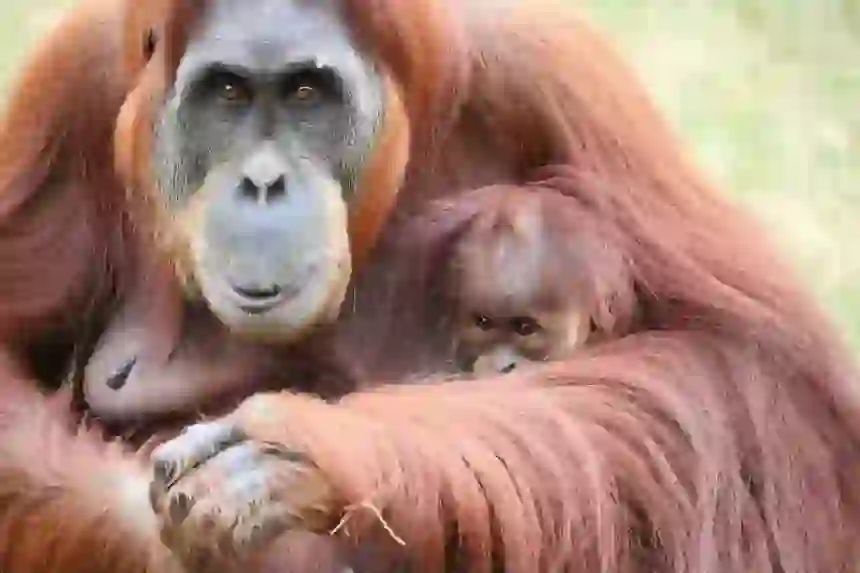
Why do orangutans live there?
Orangutans live only on the Indonesian islands of Sumatra and Borneo.
So why do orangutans live only in this limited area? The answer to this question becomes clear when we look at the lives of orangutans.
Orangutans are plant-eating animals, and 99% of their food is said to be fruits, leaves, and other plants. When I go to bed, I make a bed of branches and leaves on the tree and sleep. In other words, orangutans spend most of their day in trees.
For that reason, the body of the orangutan has arms twice as long as the legs, and the hands are made to be short on the thumb and long on the other fingers, making it suitable for living in trees about 30m above the ground. On the other hand, on the ground, you cannot run or jump quickly.
In other words, orangutans depend on tropical rainforests for most of their lives, including food and places to live, and can only survive in rich tropical rainforests such as Sumatra and Borneo.
In the past, in addition to their current habitat, many orangutans used to live in the Malaysian Peninsula and Java. However, we humans have cut through forests to use wood and to create ranches and fields, and we have reduced the number of places where orangutans can live.
The orangutans of Java are thought to have become extinct around the 17th century, although the exact reason and timing are unknown.

What do orangutans eat?
Wild orangutans feed on plant leaves and fruits, bark and flowers, and plants such as mushrooms and moss. 99% Of their food is plants, and depending on their habitat, they seem to eat at least 160 different kinds of plants.
In the case of fruits, they eat figs and durians, but like humans, they tend to prefer sweet and juicy fruits.
The remaining 1% of the food is insects (ant, termite, bee, etc.), But in rare cases, people have been seen licking the soil to replenish minerals and eating dead monkeys, birds, eggs, and other animals.
The orangutans living in the zoo eat a variety of vegetables (cabbage, carrots, sweet potatoes, Chinese cabbage, tomatoes, etc.), Fruits (apples, bananas, oranges, pineapples, etc.), And animal products (boiled eggs, dried fish, milk, yogurt, etc.).

How intelligent are orangutans?
Orangutans are said to be highly intelligent animals, along with chimpanzees. Its intelligence is thought to be roughly the same as a five-year-old's if we compare it to a human.
Wild orangutans, who have nothing to do with humans, are also known to behave very intelligently.
In the case of wild orangutans, it has been witnessed that they use the branches of trees with many leaves like umbrellas during torrential rains, eat medicinal herbs to control parasitic infections, and chew medicinal herbs with their mouths to treat pain and inflammation, and then rub the juice that comes out into their bodies.
Incidentally, among the orangutans kept in zoos, surprisingly, there are orangutans who use iPads.
How he uses his iPad is that he acts like a human being, watching videos of orangutans like himself, watching anime, drawing pictures, and using game apps to his advantage.

Is it true that a new species of orangutan has just been discovered?
It's true.Prior to 2001, orangutans were considered to be a single species, regardless of their habitat.
However, as a result of various studies, since 2001, the mainstream has been the idea that the "sumatra orangutan" distributed in Sumatra and the "borneo orangutan" distributed in Borneo are separate species, and that the orangutan is a total of two species.
Later, on November 2, 2017, a new species of orangutan was confirmed in Sumatra, surprising people all over the world. This is because it is very rare to find a new species of an animal as large as an orangutan.
The third newly identified orangutan, the "tapanuri orangutan", was once considered to be a population of the Sumatra orangutan.
However, as a result of a bone survey, it was found that the tapanuriorangutan has larger canine teeth than other orangutans and is similar to the old type of orangutan that had been found as fossils, indicating that it is a new species.
At present, only about 800 tapanuriorangutans are thought to live in the area, and compared to the other two species of orangutans, there is a high possibility that they will become extinct in the near future.

What kind of personality is an orangutan?
Orangutans are considered to be relatively quiet and reserved.
Of course, males sometimes fight with each other over females, but males do not get angry when their children interfere with them when they are mating with females.
Also, unlike other apes such as chimpanzees and gorillas, there have been no cases of humans being attacked or injured by wild orangutans at this time.
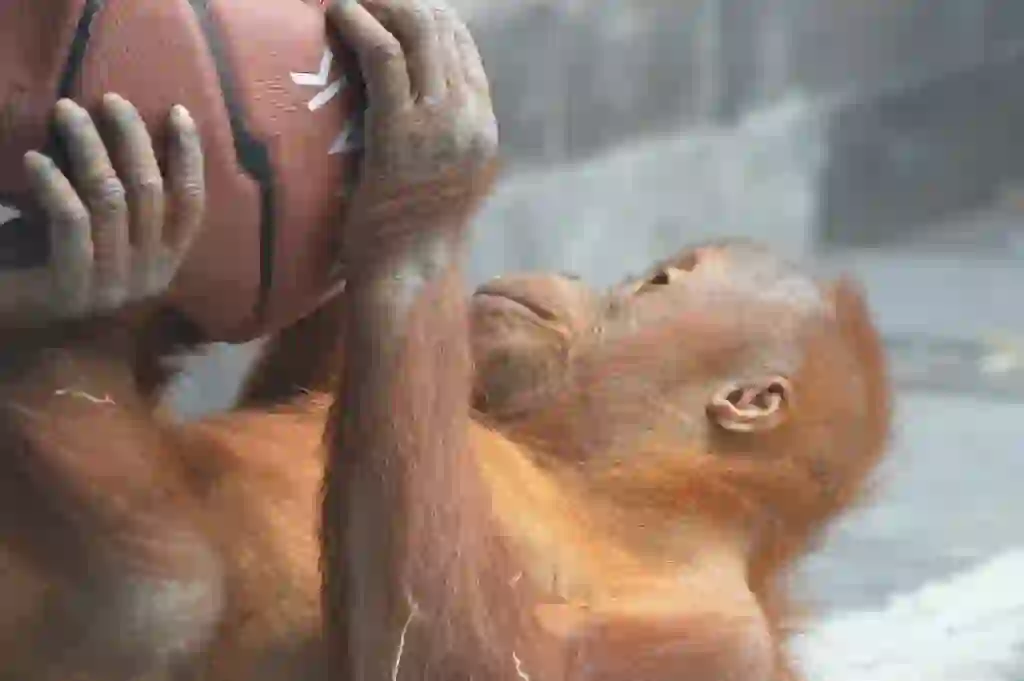
Why do orangutans live alone?
Orangutans are the only animals among the apes that do not form groups and live alone. However, in fact, living in packs has the advantage of making it easier to detect natural enemies and having an advantage when attacked by natural enemies.
Why on earth do orangutans not form flocks despite such advantages? The answer to this question can be found by looking at the food situation in the forests where orangutans live.
The rainforest where orangutans live may seem rich at first glance, but the fruit they eat as their staple food only bears fruit once every few years.
There is a long period of time when there are no fruits in the forest, so if you form a herd, there is a high possibility that you will not get enough food, but if you live alone, you will be able to secure enough food to live on.
For this reason, it is thought that orangutans basically live alone and avoid contact with other individuals.
Incidentally, orangutans store fat by eating tens of thousands of calories of fruit a day during the period when there are many fruits, and survive by burning the stored fat during the period when there are no fruits.
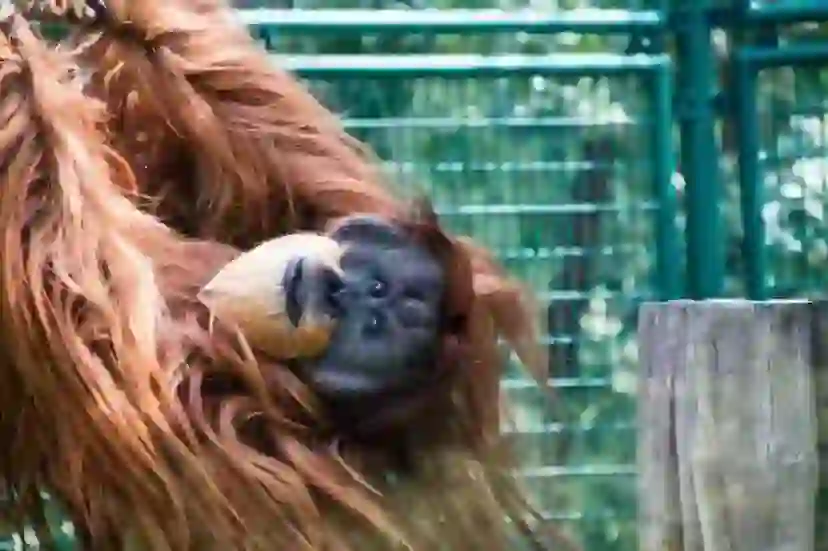
How long does an orangutan last?
The lifespan of orangutans is not clearly known, but in the wild, the lifespan of Sumatra orangutans is thought to be 58 years or older for males and 53 years or older for females.
Gypsy, a Borneo orangutan from the Tama Zoo in Tokyo, Japan, and Puan, a Sumatra orangutan from the Perth Zoo in Australia, are said to have lived the longest in captivity. Both were females and died at an estimated age of 62.

Can orangutans be kept as pets?
I want to keep an orangutan as a pet because he is very smart and sometimes shows human-like gestures! Some of you may have thought about it. So can orangutans actually be kept as pets?
In this article, I will mainly focus on whether or not orangutans can be kept in Japan.
Orangutans are designated as "specified animals" by Japanese law, which can be dangerous to human life and property.
Since June 1, 2020, it has been completely prohibited to keep specified animals for pet purposes, and orangutans cannot be kept as pets in Japan.
Orangutans are also classified in "AppendixⅠ" of the Washington Convention. Since animals classified in AppendixⅠ are protected worldwide, it is determined that they cannot be traded between countries unless there is a special purpose such as research.
For this reason, orangutans are designated as animals that cannot be sold or bought for pet purposes.
As mentioned above, orangutans are normally prohibited from being kept as pets, but unfortunately, there are a certain number of people in the world who would like to keep orangutans as pets.
Especially in Indonesia, keeping orangutans is considered to be the status of being rich, and there seems to be no end to the number of people who try to poach and purchase orangutans even in violation of treaties and laws.
Orangutan babies are as cute as human babies, but as they grow up, they stop listening to others. There is no end to the number of cases where people have started keeping a pet without knowing it, and then have to let it go when they can no longer keep it.
Orangutans who were caught by humans when they were small and raised as pets do not know how to survive in the wild or how to raise children. As a result, the orangutans that are given away will not be able to return to the wild, will not have children, and will spend the rest of their lives in shelters and zoos.
I think we should think about how to relate to wild animals once again, to see if we need to sacrifice the freedom of orangutans to keep them as pets.

What enemies do orangutans have?
It is said that snakes are the natural enemies of wild orangutans.
Since many poisonous snakes live in Borneo and Sumatra, orangutans sometimes seem to fall victim to snakes.
Tigers also live in Sumatra, but orangutans rarely descend to the ground, so they are rarely attacked by tigers.
However, the orangutan's biggest enemy is not snakes or tigers, but us humans. We cut through the rainforest and robbed more and more of the orangutans of their homes. As a result, over the past 100 years, the number of orangutans has decreased by 80%.
Orangutans are protected locally, but their habitat is actually declining, and poaching for pets or for meat continues to be a constant problem. In addition, even in national parks where animals and plants are supposed to be protected, there is no end to the illegal logging of trees.
It is said that one of the major factors that are reducing the habitat of orangutans is the plant oil palm. Oil palm is a plant that produces oil called palm oil, and palm oil is called "vegetable oil" and is used in all kinds of foods and cosmetics.
In order to mass-produce this convenient and easy-to-use palm oil, it is necessary to build oil palm plantations, but the price is that the tropical rainforests of Sumatra and Borneo are being cut open in large quantities.
It is difficult for non-locals to be directly involved in the protection of orangutans, but they can be indirectly involved in the protection. All we can do is try not to waste any resources and buy products that are working to protect nature.
Paper products that are produced using methods that have less impact on nature are marked with "FSC certification" and products that use palm oil are marked with "RSPO certification," so by choosing and using such products, you can help protect the forests where orangutans live.

Would you like to become a part of the 'Animalbook.jp'?
Turn your knowledge into Q&A and share it with the world. ※Publication will be activated after purchase. Let's share information together!
Orangutan Type of List
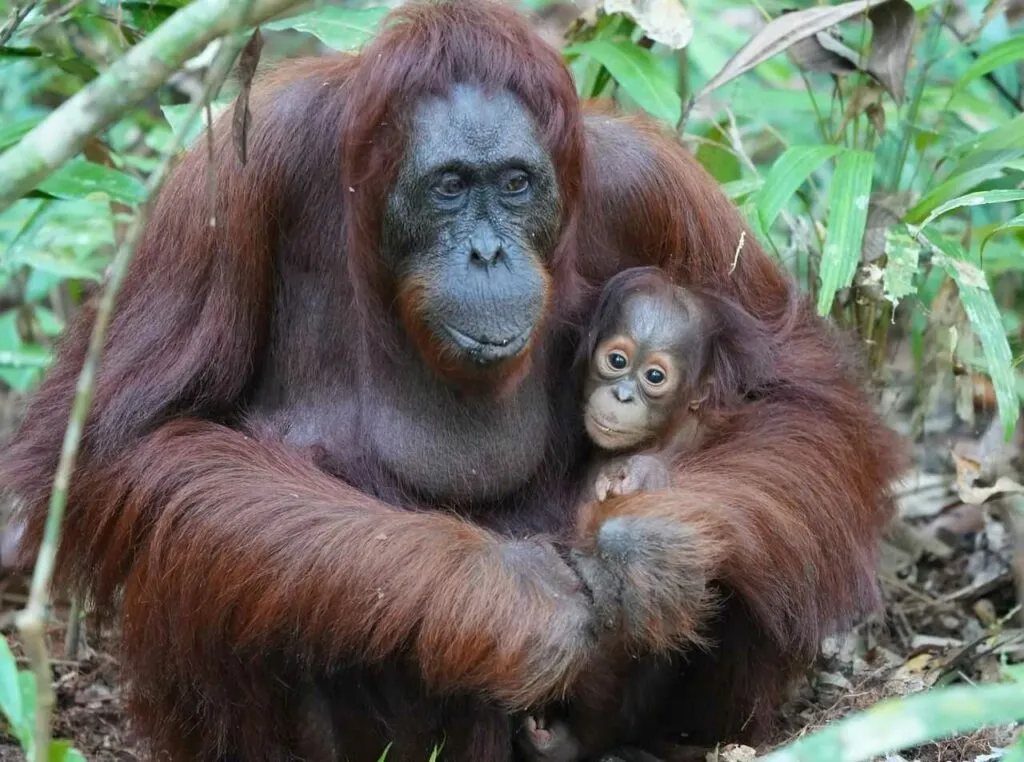
・Bornean Orangutan ・Sumatran Orangutan ・Tapanuli Orangutan
Information
Congratulations! You are the first commenter!

Create Your Favorite List!
Orangutan
Save the animals you love! Build your own list to quickly revisit your favorites later.

Would you like to leave a comment?
※Please note: This is for the purchase of rights to post comments within the article.
Find Your Favorites!
Our shop offers a unique and attractive selection of goods themed around various animals.
Orangutan References

- 久世 濃子(2018年)『オランウータン: 森の哲人は子育ての達人』東京大学出版会
- 金森 朝子(2013年)『フィールドの生物学11 野生のオランウータンを追いかけて マレーシアに生きる世界最大の樹上生活者』東海大学出版会
- 日本オランウータンリサーチセンター「オランウータンQ&A」 https://www.orangutan-research.jp/qa/
- 東京ズーネット「ボルネオオランウータン」 https://www.tokyo-zoo.net/encyclopedia/species_detail?code=25
- よこはま動物園ズーラシア「ボルネオオランウータン」 http://www.hama-midorinokyokai.or.jp/zoo/zoorasia/animal/asia/BorneanOrangutan/
- 静岡市立日本平動物園「あらかると 「オランウータンの食生活」」 https://www.nhdzoo.jp/sp/newspaper/naka.php?newspaper_uid=612&newspaper_num=118
- WWFジャパン「スマトラ島で確認された「第三」の新種オランウータン”タパヌリオランウータン”」 https://www.wwf.or.jp/activities/news/193.html
- WWFジャパン「オランウータンの生態と、迫る危機について」 https://www.wwf.or.jp/activities/basicinfo/3564.html
- 京都大学霊長類研究所「霊長類についての質問」 https://www.pri.kyoto-u.ac.jp/PRI-QandA/Bqanda.html
- イーアイデム ジモコロ「孤独を愛する ふしぎな動物―「オランウータン」のすべてを研究者に聞いた」 https://www.e-aidem.com/ch/jimocoro/entry/galaxy023
- 日本経済新聞「オランウータンがiPad 夢は人間と意思疎通」 https://www.nikkei.com/article/DGXNASDG1000Q_Q3A110C1CR0000f
- 特定外来生物・特定(危険)動物へのマイクロチップ埋込み技術マニュアル 3大型サル類〈ゴリラ、オランウータン、チンパンジー〉 https://www.env.go.jp/nature/dobutsu/aigo/2_data/pamph/h1804/05.pdf
- 千葉市動物公園「オランウータンのかんさつシート」 https://www.city.chiba.jp/zoo/school/documents/10orangutan-worksheet.pdf
Orangutan Introduction of media used
出典:https://pixabay.com/videos/id-17714/

出典:https://unsplash.com/photos/8_5sEk7Ay18

出典:https://pixabay.com/images/id-4528025/

出典:https://pixabay.com/images/id-2310794/

出典:https://unsplash.com/photos/BIOvLzi9bMM

出典:https://unsplash.com/photos/nwBK42_RcUc

出典:https://pixabay.com/images/id-3534147/

出典:https://pixabay.com/images/id-4302682/

出典:https://unsplash.com/photos/DHQdvZ00bCE

出典:https://unsplash.com/photos/we-21MvAhJY

出典:https://pixabay.com/images/id-481016/
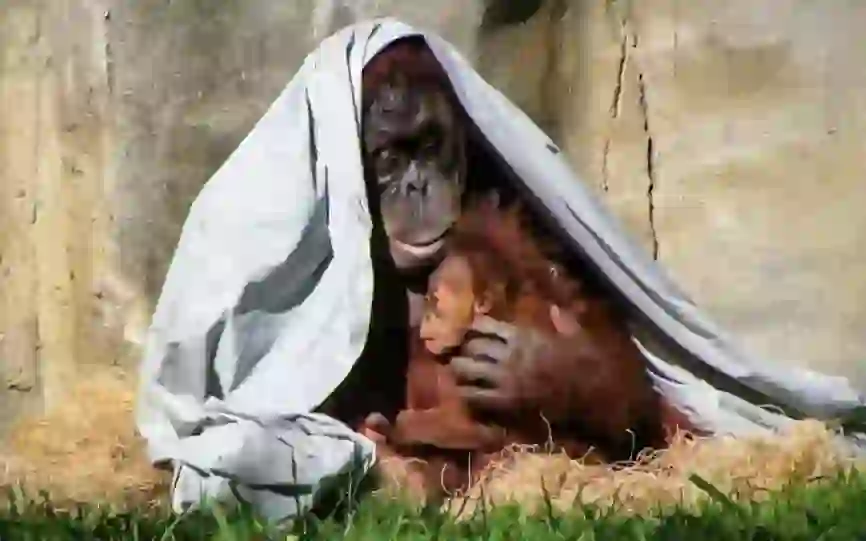
出典:https://unsplash.com/photos/i8w4S4zdApk
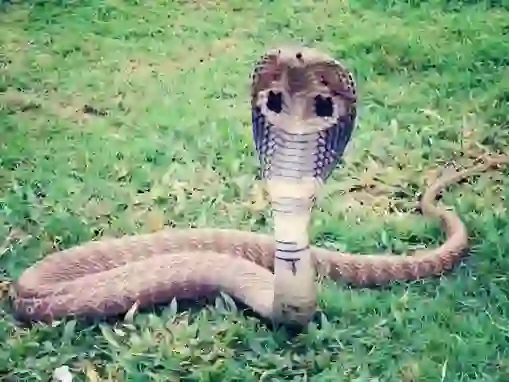
enemy
出典:https://pixabay.com/images/id-405623/

出典:https://pixabay.com/images/id-3712508/

Help Enrich Our Animalbook.jp with Your Media!
We are constantly looking to expand and enrich our Animalbook.jp with amazing photos and videos of animals. If you have any media that you'd like to share, please contribute and help us showcase the beauty and diversity of the animal kingdom. Your submissions will be credited and featured in our encyclopedia, reaching a wide audience of animal lovers.


















